Port Adelaide’s training camp an example of how embracing masculinity can help build mateship
Port Adelaide players grappled, wrestled, tackled and buried themselves in the Gold Coast sand as part of their pre-season training camp. It’s that macho, cathartic stuff that bonds teams together, writes Graham Cornes.
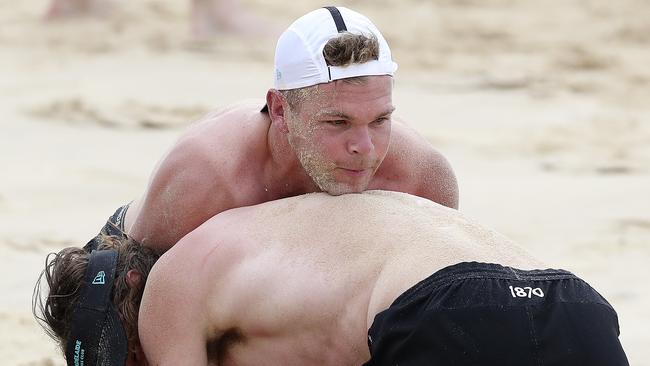
- ‘It knocked me’: Ebert concussion was like ‘solid hangover’
- How to get the most out of your Advertiser digital subscription
It gladdened this old footballer’s heart to see the young Port Adelaide footballers getting down and getting dirty on their recent training camp in Queensland.
There they were, wrestling, grappling, tackling and burying themselves in the Maroochydore sand.
The group sit-ups - players holding aloft that massive cable as the Pacific surf crashed over them - drew comparisons with the elite US Navy Seal program.
Then there was Paint Ball – simulated combat as the various teams battled for supremacy. Blood, bruises, scratches, exhilaration, and adrenaline surges - maybe even a shadow of fear - are all part of the exercise.
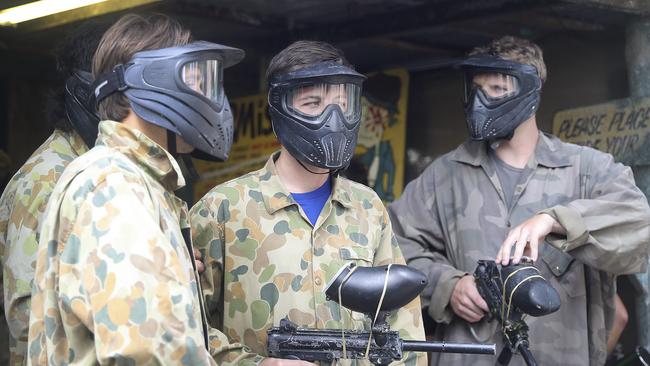
Don’t tell me blokes don’t love all that macho, cathartic stuff.
And the most important ingredient?
Laughter - it’s always a good indicator of a positive team spirit.
However, those two words - “training camp” - are enough to make any AFL football operations manager run for cover.
The Adelaide Crows and Collective Mind put paid to that.
Regardless of the distortion of facts and the wilful, destructive hysteria that accompanied the fallout from that camp, there is still immense value in taking your team away, removing them from their comfort zone and putting them through all sorts of rigorous physical and psychological tests.
The AFL is very sensitive about such issues, though.
Clubs are now required to tell the AFL where they are going, what they are doing and who will be running the show.
Fair enough, but every year footballers are restricted by new rules and expectations which seem intended to dilute their masculinity.
Stream over 50 sports live and on demand with KAYO SPORTS. Just $25/month, no lock-in contract. Get your 14-day free trial and start streaming instantly.

Modern definitions of masculinity and new terms are added to the lexicon almost daily. “Toxic-masculinity” is responsible for the world’s evils, apparently.
Megan MacKenzie, a Professor of Gender and War (go figure) at the University of Sydney, tells us that “fragile-masculinity” is the biggest obstacle to climate action.
Cara Daggett, an expert on the politics of energy and the environment at Virginia Tech, theorises that “petro-masculinity” fuels “western development and provide[s] world leaders with power and a sense of manliness”.
Hmmm.
Does anyone else feel that masculinity has nothing to do with it?
There are always evil men who somehow ascend to positions of power, just as there are dopey politicians who constantly deny science.
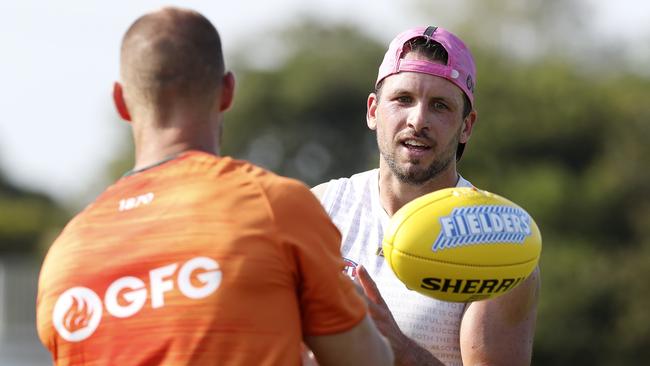
Not to mention greedy corporate types who see only seven figure salaries and bonuses.
They can’t define our masculinity.
So, how “masculine” do we want our footballers to be?
The Port Adelaide camp was a great example.
For behind those spectacular images of finely tuned bodies fighting, playing and laughing there was a more significant psychological component to the camp.
“Connections”.
That word again.
It’s prominent in almost every pre-season discussion.
Like the Crows had Collective Mind, Port Adelaide had The Resilience Project.
The Resilience Project is a company run by Hugh van Cuylenburg, an educator who has completed postgraduate studies in resilience and wellbeing.

His bio is impressive.
He has worked with the NRL, the Australian cricket, netball, women’s soccer and women’s rugby league teams.
Add every A-League team, the AOC and 10 AFL teams to the list plus one-on-ones with Steve Smith, Dustin Martin and Billy Slater and the resumé is overwhelming.
Ironically, his website is in Port Adelaide colours.
Connections and Resilience.
Are the two related?
The relationship between coach and players, players and coach, and teammates to teammates has never been more emphasised in sport.
Resilience is increasingly vital in a professional sporting environment where mental health is constantly exposed.
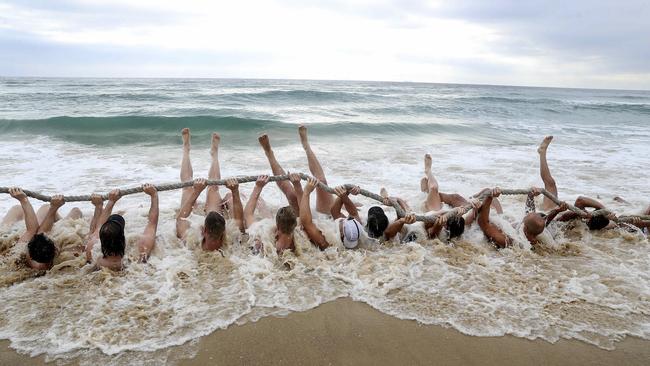
Following the successful Richmond mantra of Heroes, Highlights and Hardship, the Port players are encouraged to share their vulnerabilities and further, to embrace them.
Stories of their goals, their fears and hurdles they have had to overcome are voluntarily shared.
Admirable qualities like gratitude and humility are encouraged and espoused.
Reviews of those macho activities focus, not so much on the brutality of it all but more on “what more could we have done to help each other?”
Similarly, “how could we have done it differently and what more could we have done?”
So, the connection that comes with such frankness is on all levels.
Added to our traditional concepts of masculinity are those more admirable “sensitive” qualities.
It doesn’t suit the narrative of the man-haters, the hostile feminist agendas or even contemporary advocates of the woke movement, but there is much to like about contemporary masculinity.
MORE PORT ADELAIDE NEWS
How KT helped drive Port on road to recovery
Gray: I wish we were playing this week
Our behind the scenes wrap on Port’s pre-season camp
Power pays big chunk off AFL debt, avoids $1.3m loss
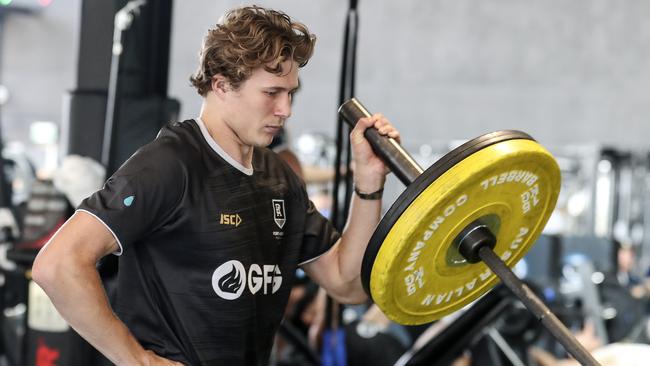
The modern footballer’s masculinity is more merciful that toxic.
It’s a much broader issue - more society’s than football’s alone.
The recently retired headmaster of one of Australia’s most exclusive boys schools took issue with the increasing debate about what it means to be a man in the 21st century.
For 17 years Dr Timothy Wright was headmaster of Sydney Church of England Grammar School.
He protested against the increasing prevalence of marginalising young men by describing masculinity as “toxic”.
He prefers the term “manliness”.
“Manliness is about having honour, dignity and being unwilling to exploit others. It’s the opposite to how masculine behaviour is often portrayed, as bullying or sexually exploitative”, he said, which is how footballers are often described by those seeking a soft target for their gender-specific agendas.
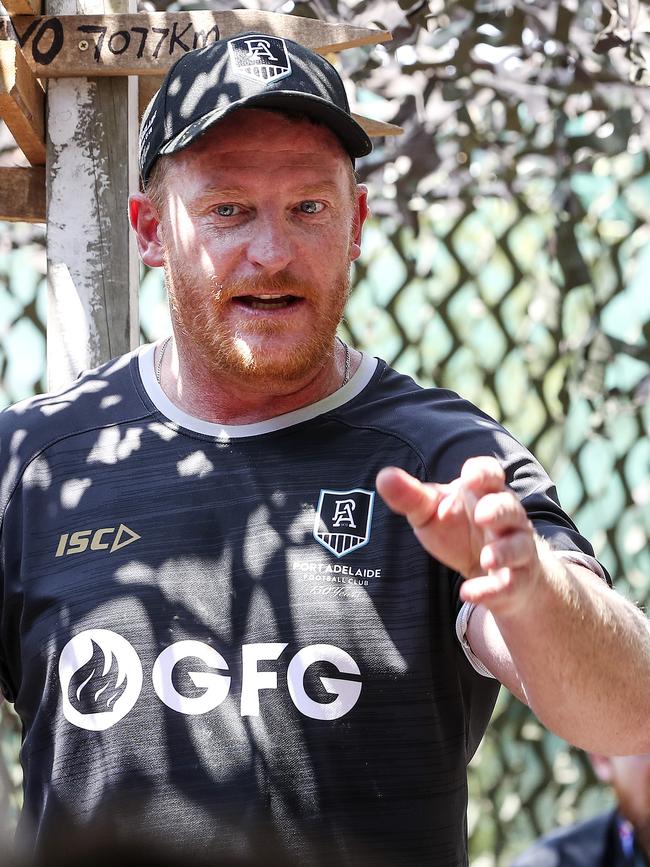
Still, that was probably the last thing the Port footballers were thinking about when they were locked in faux combat on that Queensland beach or slugging it out in competitive football drills.
Boys being boys, they simply were desperate to win.
Their senior assistant coach Michael Voss was a most combative, gladiatorial warrior/footballer.
Senior figures around the club are amazed at his willingness to embrace the more sensitive qualities expected of the modern footballer.
“He drives the program,” said Port’s general manager of football, Chris Davies.
Maybe so.
We know the modern footballer is decidedly different, but for 120 minutes on match day, give me the warrior – not the merciful.
